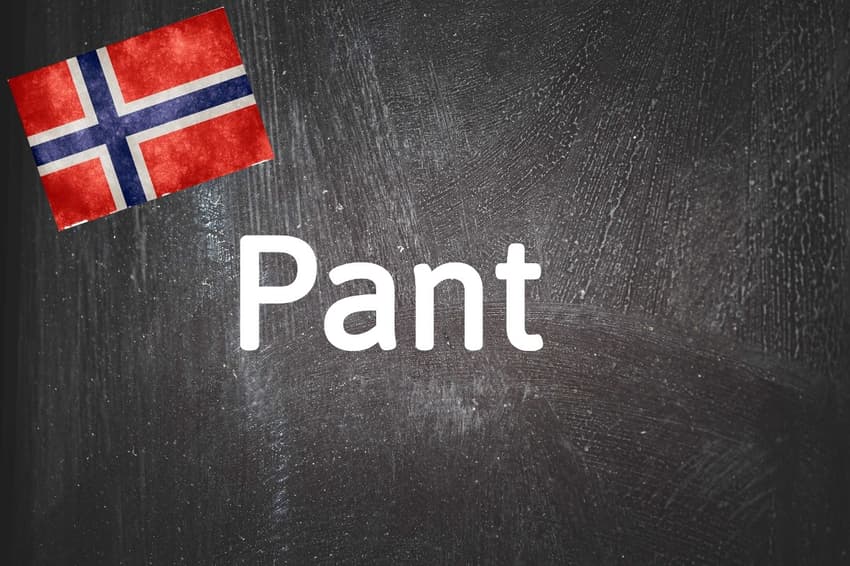Norwegian word of the day: Pant

This Norwegian false friend has a different meaning to its English counterpart but is nonetheless crucial for life in Norway.
What is pant?
Pant has nothing to do with trousers, underpants or being hopelessly out of breath. In English, it refers to money paid as a security for something. The English translation would be a refundable deposit or security.
In Norwegian, a pantebrev (mortgage deed) is a document which means a mortgage has been taken out against it. You can also pay money in pant as security against other kinds of debts.
While mortgages and loans can set people back millions, pant also applies to more minor and mundane purchases. When buying recyclable bottles and cans, you will be required to pay a pant fee.
This pant is separate from the price, meaning that if a drink costs 20 kroner, you will likely pay between 2 and 3 kroner extra for the pant.
You get pant back by recycling bottles at panteautomater (bottle and can recycling stations), which can be found in almost all Norwegian supermarkets. The money is paid out by the machine in the form of a receipt, which you can hand in at the checkout for cash or have it deducted from the cost of your food shopping. Some recycling stations will also allow you to donate the money to charity too.
Why do I need to know this?
Bottle recycling in Norway goes back to 1902 when returning bottles to the breweries for the equivalent of 4 kroner. The scheme was later adapted to apply to mineral water. Norway’s wine monopoly would also implement its own scheme, but it ended in 2001.
In May 1999, the pant flaskepant system as we know it today was introduced by Infinitum (formerly Norsk Resirk A/S).
The verb å pante means to hand something in and get money in return, but usually, it refers simply to the act of recycling bottles. You can also use pant to talk about other similar recycling schemes, for example, at music festivals, which might charge a pant fee for their plastic or paper cups, which is returned if you bring them for recycling.
Vi har så mange tomflasker hjemme etter festen på fredag. Jeg går på butikken og panter de.
We have so many empty bottles at home after the party on Friday. I’m going to the store to cash them in.
Jeg pantet flasker for 100 kroner i går.
I got 100 kroner from returning bottles yesterday.
Comments
See Also
What is pant?
Pant has nothing to do with trousers, underpants or being hopelessly out of breath. In English, it refers to money paid as a security for something. The English translation would be a refundable deposit or security.
In Norwegian, a pantebrev (mortgage deed) is a document which means a mortgage has been taken out against it. You can also pay money in pant as security against other kinds of debts.
While mortgages and loans can set people back millions, pant also applies to more minor and mundane purchases. When buying recyclable bottles and cans, you will be required to pay a pant fee.
This pant is separate from the price, meaning that if a drink costs 20 kroner, you will likely pay between 2 and 3 kroner extra for the pant.
You get pant back by recycling bottles at panteautomater (bottle and can recycling stations), which can be found in almost all Norwegian supermarkets. The money is paid out by the machine in the form of a receipt, which you can hand in at the checkout for cash or have it deducted from the cost of your food shopping. Some recycling stations will also allow you to donate the money to charity too.
Why do I need to know this?
Bottle recycling in Norway goes back to 1902 when returning bottles to the breweries for the equivalent of 4 kroner. The scheme was later adapted to apply to mineral water. Norway’s wine monopoly would also implement its own scheme, but it ended in 2001.
In May 1999, the pant flaskepant system as we know it today was introduced by Infinitum (formerly Norsk Resirk A/S).
The verb å pante means to hand something in and get money in return, but usually, it refers simply to the act of recycling bottles. You can also use pant to talk about other similar recycling schemes, for example, at music festivals, which might charge a pant fee for their plastic or paper cups, which is returned if you bring them for recycling.
Vi har så mange tomflasker hjemme etter festen på fredag. Jeg går på butikken og panter de.
We have so many empty bottles at home after the party on Friday. I’m going to the store to cash them in.
Jeg pantet flasker for 100 kroner i går.
I got 100 kroner from returning bottles yesterday.
Join the conversation in our comments section below. Share your own views and experience and if you have a question or suggestion for our journalists then email us at [email protected].
Please keep comments civil, constructive and on topic – and make sure to read our terms of use before getting involved.
Please log in here to leave a comment.